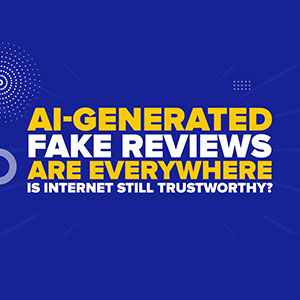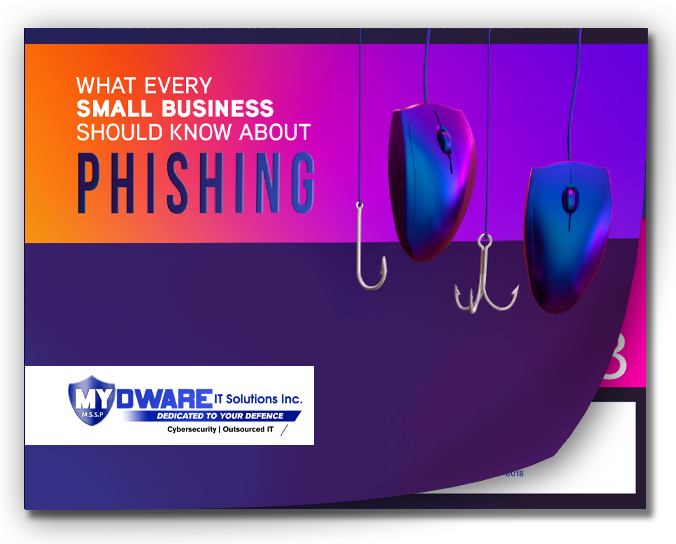 Fake online reviews have been around for years, but AI has made them harder to spot and easier to mass-produce. Fraudsters are using AI-powered tools to generate thousands of fake reviews, making products and services appear more popular—or discrediting competitors.
Fake online reviews have been around for years, but AI has made them harder to spot and easier to mass-produce. Fraudsters are using AI-powered tools to generate thousands of fake reviews, making products and services appear more popular—or discrediting competitors.
For businesses in Canada, this isn’t just annoying—it’s a real threat. Consumers rely on online reviews to make purchasing decisions, and when fake reviews flood the market, legitimate businesses lose credibility and revenue.
Protect your business from AI-driven scams. Start with a FREE cybersecurity risk assessment today.
Why AI-Generated Reviews Are a Growing Threat
Online reviews have become a critical factor in customer decision-making, with 89% of consumers reading reviews before making a purchase. But AI is now being used to manipulate public perception, creating a flood of deceptive reviews that mislead customers and hurt honest businesses.
These fake reviews can be used to inflate ratings for low-quality products or damage a competitor’s reputation overnight. The issue has become so widespread that Canada’s Competition Bureau has warned businesses about deceptive online review practices, calling for stricter enforcement.
Cybercriminals and fraudsters are finding new ways to exploit AI for profit. Learn more in Top 5 2025 Cybersecurity Predictions You Surely Need.
3 Ways AI-Generated Reviews Are Hurting Businesses
Fake reviews don’t just mislead customers—they create unfair competition and harm businesses that rely on genuine feedback.
1. Fake Reviews Manipulate Customer Trust
AI-generated reviews mimic real customer experiences with shocking accuracy, making it difficult for consumers to tell what’s real and what’s fake. Many businesses lose sales simply because they can’t compete with the flood of AI-generated positivity for competitors.
2. Competitor Sabotage Damages Reputations
Some businesses use AI-powered fake reviews to attack competitors, flooding their pages with negative comments to lower ratings and drive potential customers away. A single wave of fake one-star reviews can cause a drastic drop in sales and credibility.
3. Platforms Are Struggling to Keep Up
Despite efforts to crack down on fake reviews, AI-generated content is evolving faster than detection tools. Online platforms like Google and Yelp are constantly battling new techniques that make fake reviews more believable and harder to remove.
AI-driven scams are changing the digital landscape. Businesses must take proactive measures to safeguard their online reputation. Learn more in WHY SMBs ARE 4X MORE LIKELY TO BE A VICTIM OF CYBER EXTORTION.
How Businesses Can Protect Their Reputation
AI-generated fake reviews aren’t going away anytime soon, but businesses can take action to minimize their impact.
- Monitor online reviews regularly – Keep an eye on suspicious patterns, such as a sudden influx of overly positive or negative feedback.
- Report fraudulent activity – Most platforms allow businesses to flag fake reviews for investigation.
- Encourage genuine customer feedback – The best way to combat fake reviews is by collecting and showcasing authentic testimonials.
- Use AI detection tools – Just as fraudsters use AI to generate fake reviews, businesses can use AI-powered analytics to spot them.
Scammers are getting smarter, and businesses that ignore AI-driven threats risk falling behind. Cybercriminals are also using AI to fake IT support calls, leading to data breaches and ransomware attacks. Learn more in The New Fake IT Support Calls That Leads To Ransomware.
Don’t Let AI-Driven Scams Ruin Your Business
AI-generated fake reviews are damaging consumer trust, manipulating markets, and costing businesses money. As this problem worsens, companies that fail to adapt will struggle to compete.
Get a FREE cybersecurity risk assessment and protect your reputation before it’s too late.
Darryl Cresswell
CEO & President
MYDWARE IT Solutions Inc.




